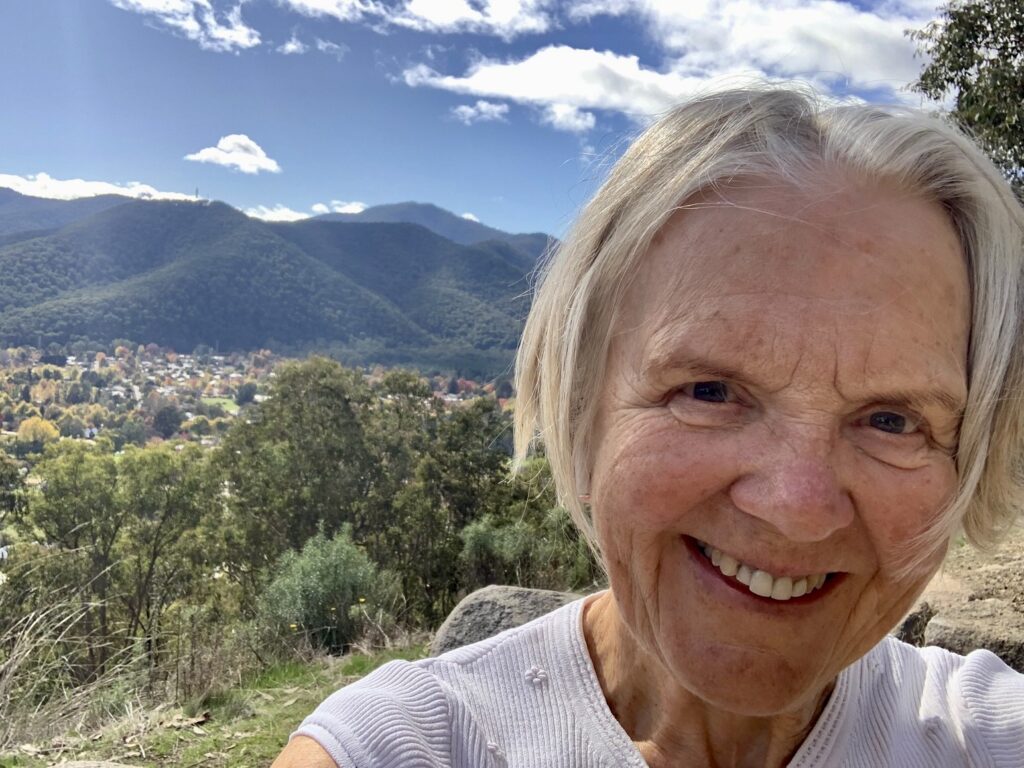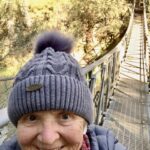A Bright story of life beyond an eating disorder

A Bright story of life beyond an eating disorder
I am writing from Bright, a town as beautiful as its name in north-east Victoria, Australia. I am on a three-day getaway with my English Staffordshire Terrier, Maisie. The two of us. We are staying in a delightful studio apartment beside the crystal-clear Ovens River that borders the town. There are bush tracks everywhere. Bliss.
The car journey from home was more than 400km, a distance that we covered in six hours with regular roadside stops.
 I am sharing this event with you because this trip is another little miracle in the life of June. The fact that I am travelling independently with my loyal Staffy companion marks another step in healing from an eating disorder that plagued my life from age 11 to 55.
I am sharing this event with you because this trip is another little miracle in the life of June. The fact that I am travelling independently with my loyal Staffy companion marks another step in healing from an eating disorder that plagued my life from age 11 to 55.
Getting on with life is easier said than done when you have an eating disorder. An eating disorder is a sneaky, deceptive illness, infiltrating and manipulating thoughts. It emerges under the guise of being a reliable friend, on call 24/7 to assist with all difficult moments.
In the early 1960s, neither my parents nor I had any understanding that an illness had developed in my brain and was severely affecting my thoughts and behaviours.
I had some inkling I wasn’t quite like other children. I was told I was “difficult”, “stubborn”, “anti-social”, and “self-centred”. I wanted to be like others but didn’t know how – so I would withdraw. The eating disorder was always there to ease my anxiety, at least for a short while.
As the years passed, however, the pretence became more difficult to mask. The eating disorder was showing its true colours – it wasn’t a friend; it was a fiend. It did not want to help me; it wanted to kill me. By my mid-twenties, with four children under five, I was beginning to think something was seriously wrong with me. Increasingly, my mind was not my own. I figured I was either incredibly weak for not managing daily life (eating three meals a day was an impossible task) or, worse, I was going insane.
I became suicidal. This was a very difficult time for my husband and young children.
My love for the children – I wanted to see them grow up – gave me the strength to reveal my inner struggles with a doctor for the first time. To do this I had to push aside my greatest fear, that is, of being labelled insane, locked up, and my children taken from me.
Five more torrid years passed, with referral after referral. Doctors scratching their heads, unable to help me, unable give a correct diagnosis, and suggesting (because they sensed that diary writing was helping me to hang on to life) that I keep writing. In my early 30s, a psychiatrist saw ‘me’ beyond the layers of illness, and so began a long rescue and recovery of the little girl June who had been taken prisoner by anorexia all those years ago.
I was 55 years’ old when I regained 51 per cent of my healthy self, and could eat three meals and three snacks daily, day after day, without a skerrick of guilt. This was a major feat, but more was to come.
An eating disorder is about food but also many other aspects of life. We need to eat nourishing food for our body and brain to operate at optimum level. When our brain is starved, and we are genetically vulnerable to an eating disorder, every aspect of life is affected.
Like many adults who are striving to heal from a childhood eating disorder, I had no idea of self-identity. The eating disorder had dominated my thoughts and behaviours for more than four decades. Who was I without the eating disorder?
Doctors said there was only one way to find out, and that was to experiment and explore. If I tried something and it didn’t work out, that would be okay. I would know that wasn’t for me and I could try something else. This was a period of developmental catch-up.
 I am 72 years old now. I have pieced together my identity and enjoy adding a little more to it every day.
I am 72 years old now. I have pieced together my identity and enjoy adding a little more to it every day.
For decades, my co-morbid anxiety and depression, coupled with on-going effects of childhood trauma and road trauma as a young adult, meant I was terrified of being alone. I was terrified of driving on highways. I was terrified of making major decisions. I was terrified of trying anything new. I was terrified of doing things, like bush-walking, that I knew I loved.
How did the turnaround in domination, from eating disorder to me, occur?
Ongoing healing has been possible due to guidance of health professionals (who encouraged me never to be a victim; who advised me to write when I could not verbalise the pain within; and who insisted I get back behind the wheel after a major spinal operation because “you need your independence”).
Giving up can never be an option.
Some losses, including alienation from my family of origin, experienced during my long incarceration with anorexia could not be retrieved. Health professionals firmly said that to avoid toxic effect, those losses had to be accepted and put aside. Much better, they said, to move on and focus on what IS possible. In many ways I had to create a new life for myself – a life without family of origin and without my eating disorder.
Importantly, I had to focus on my right to life. My right to live my life. My main inspiration continues to come from those four little children, who are now aged 46 to 50. They are my prime minders, mentors, and guides.
I’m also blessed to be here to watch five beautiful grandchildren blossom into adolescence and young adulthood, and I cherish a lifelong friendship with their grandfather George.
My long-time treatment team of health professionals (psychiatrist, psychologist, dietician and general practitioner (GP)) never gave up on me. They have done their job well. Today my care team has reduced to a team of one — my local GP. My only medications are for the medical conditions of blood pressure and thyroid.
During the years with anorexia, I yearned for a day, just one day without that horrid eating disorder niggle, so I could experience inner peace and contentment. This was my greatest wish.
At 72, I feel at peace. I am content. Not just one day, but every day. I love being my own best friend. I lead a community writing group that thrives on creative fun and fulfilment and am a member of the local Rotary Club. I continue to advocate for greater awareness of eating disorders, and for more support for people of all ages who develop the illness. I serve on the National Eating Disorder Collaboration steering committee in Australia and am a mentor for people with an eating disorder. All these activities help me feel that my life is purposeful and worthwhile.
If you are despairing that you will never be free of your eating disorder, I want you to know that you can be free. Keep reaching out, keep connecting with people who have your best interest at heart. Avoid triggering events and triggering people, at least until your healthy self is strong enough to cope with them.
Developing connections that nurture our healthy self, and developing a sense of belonging in our community, is incredibly important.
Which brings me to Bright. Showing myself that I can do things for myself is important to me because for decades, my eating disorder denied me this right.
 Today, Maisie and I are going to head out of Bright on another hike through the Aussie bush, a place that I love and Maisie loves, too.
Today, Maisie and I are going to head out of Bright on another hike through the Aussie bush, a place that I love and Maisie loves, too.
Cherish your dreams. Persist. Dreams do come true.
- Postscript to health professionals: NEVER give up on your patients. Listen to them. Miracles DO happen.






Wow. Thank you. Your article has been very helpful. “Self-identity” after 5 decades of AN has been pretty non existent for me. You’ve brought clarity as to the reason(s) and then a way out. I’m 65 and my hope is to be a “ late bloomer”…
Thank you, June, for your articles and insights.
Hi Kathleen, Thank you for responding! Discovering and reclaiming our self-identity is possible at every age. You can definitely be a ‘late bloomer’ – and have a lot of fun along the way. Reach out. Know that you deserve your full life. Start today!
Love and hugs from June
Thank you for this encouraging, profound article! I have been in recovery from anorexia for the past 6 years (I am now 58) after 4 decades of struggle. Every day I question if recovery is worth it and if I will ever have freedom and peace. Your story gives me hope!
Dear Christina, Recovery (reconnecting with our healthy self) requires constant hard work but the reward, of being free from our eating disorder, is priceless. Hold on to hope and the truth that you deserve a full life. Recovery of your healthy self IS possible. I hope my memoir, A Girl Called Tim, will inspire you. https://lifestoriesdiary.com/diary-healer-books/ You can do it! With love, June